Event Management Revolutionized: QR Code Usage Statistics
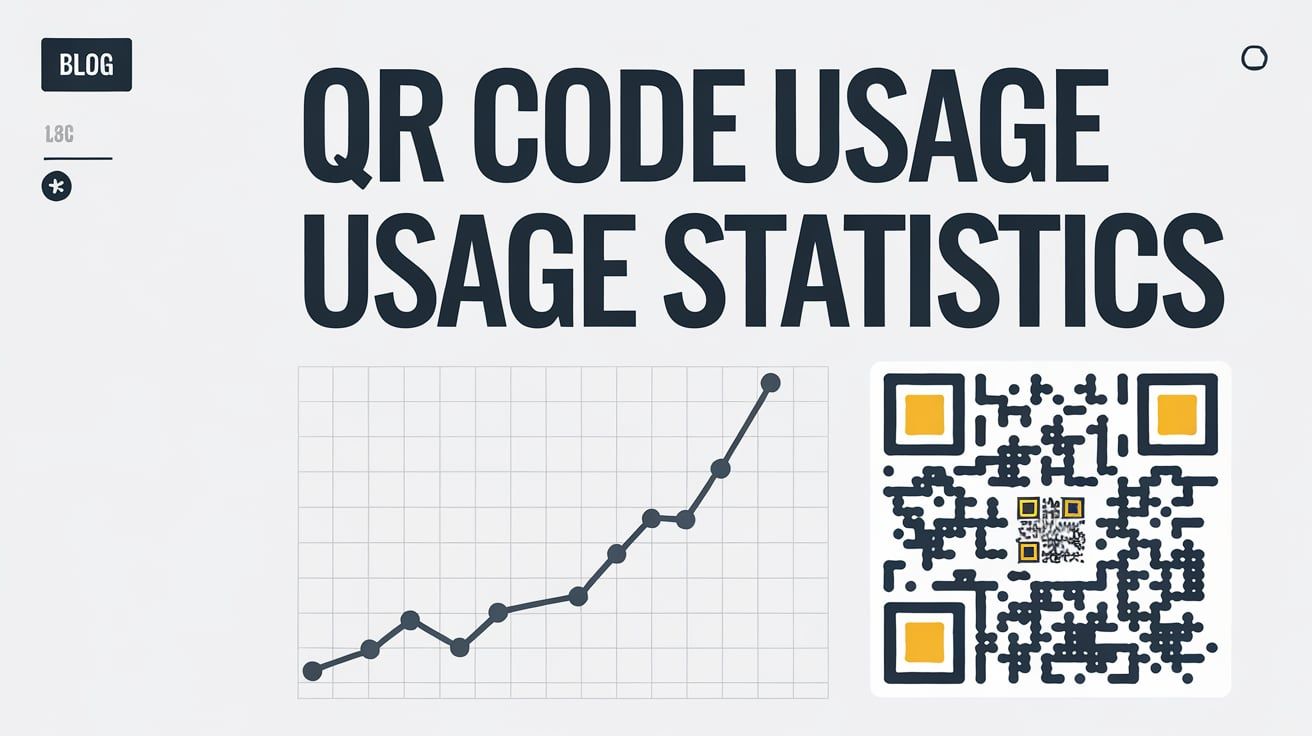

In the era of digital transformation, Quick Response (QR) codes have emerged as instrumental tools that are extensively reshaping various industries, including event management. For the uninitiated, QR codes are two-dimensional barcodes that can be scanned, typically with a smartphone, to quickly access information or a webpage.
In the context of event management, QR codes have revolutionized the way event organizers plan, execute, and manage events. The application of QR codes extends from event check-in to enhancing attendee engagement, leading to a seamless and efficient event experience.
As someone who's spent years localizing technology products and diving deep into QR code applications, I've seen firsthand how these simple yet powerful tools can transform chaotic event processes into streamlined operations. Now, let's bolster this introduction with some statistical insights to provide a perspective on the magnitude of this digital transformation in the event management industry.
📊 Stats Alert: The global event management software market was estimated at USD 8.40 billion in 2024 and is expected to reach USD 9.32 billion in 2025. Meanwhile, the broader event industry could grow to more than a trillion US dollars by 2028.
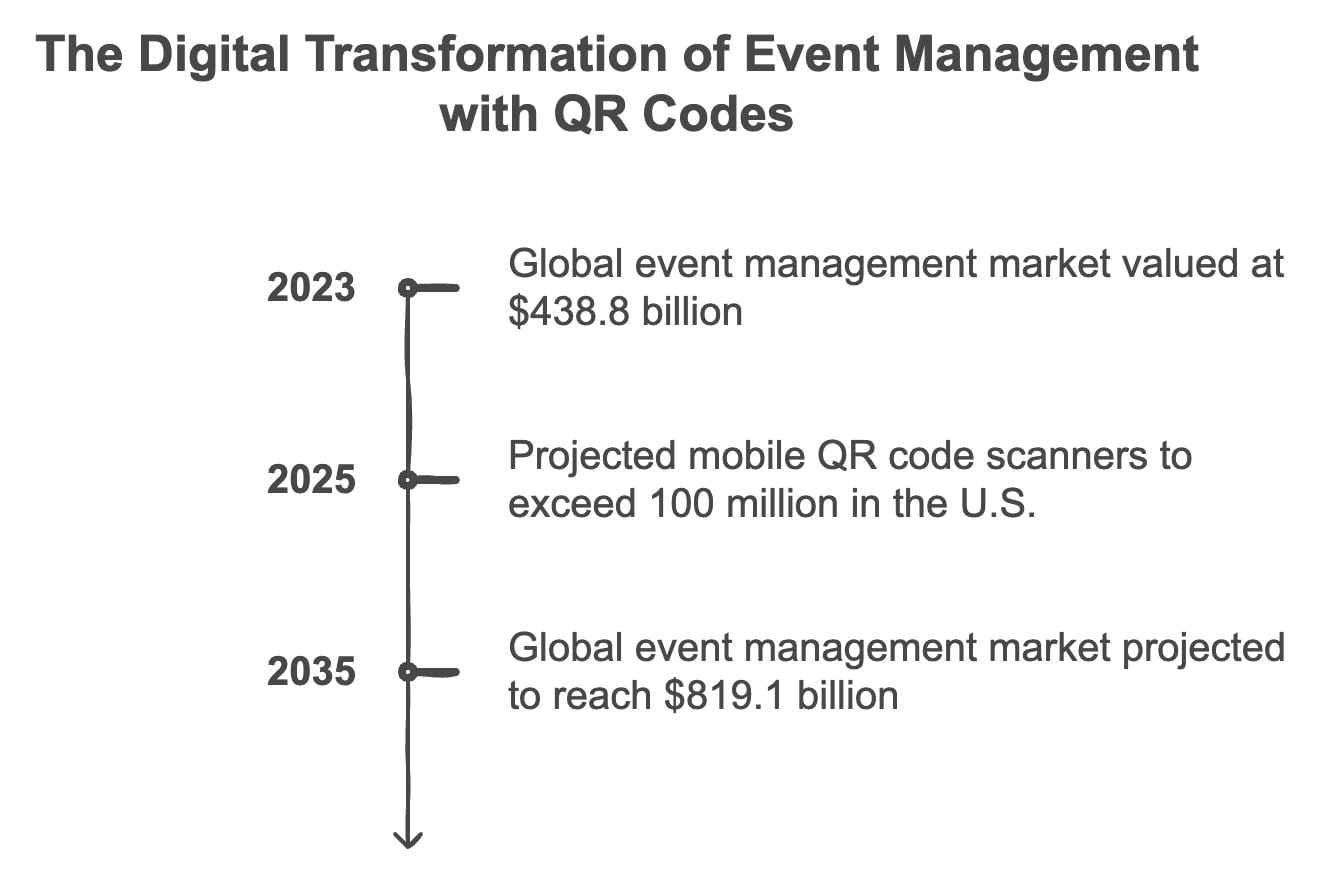
By 2022, around 89 million users were actively engaging with QR codes, signifying a 26% increase from the figures in 2020. The upward trend is projected to continue, as by 2025, mobile QR code scanners are expected to reach over 100 million users in the U.S.
This introduction provides an overview of the digital revolution in the event management industry powered by QR codes and previews the notable insights and statistics that this blog post will delve into next.
The Evolution of Event Management
Looking back, the event management landscape was dominated by traditional practices such as physical tickets, written guest lists, and manual tracking and inputting attendee data into spreadsheets or databases. These methods were not only time-consuming but were also prone to human errors.
Consider the long lines for event check-ins, misplaced tickets, errors in data entry, and more. Additionally, these practices incurred an enormous amount of environmental waste due to the massive use of paper tickets, printed schedules, and handouts. In a world that is progressively prioritizing sustainability, these traditional methods have become outdated and problematic.
Enter the digital transformation – with the evolution of technology, the tools for event management have also evolved, becoming more efficient, user-friendly, and eco-conscious. One significant technological breakthrough is the QR codes. QR codes have replaced paper tickets, simplified check-ins, and presented an eco-friendly alternative in event management.
As per a comprehensive survey from Statista, nearly 89 million users engaged with QR codes in 2022, marking a notable 26% rise from 2020.
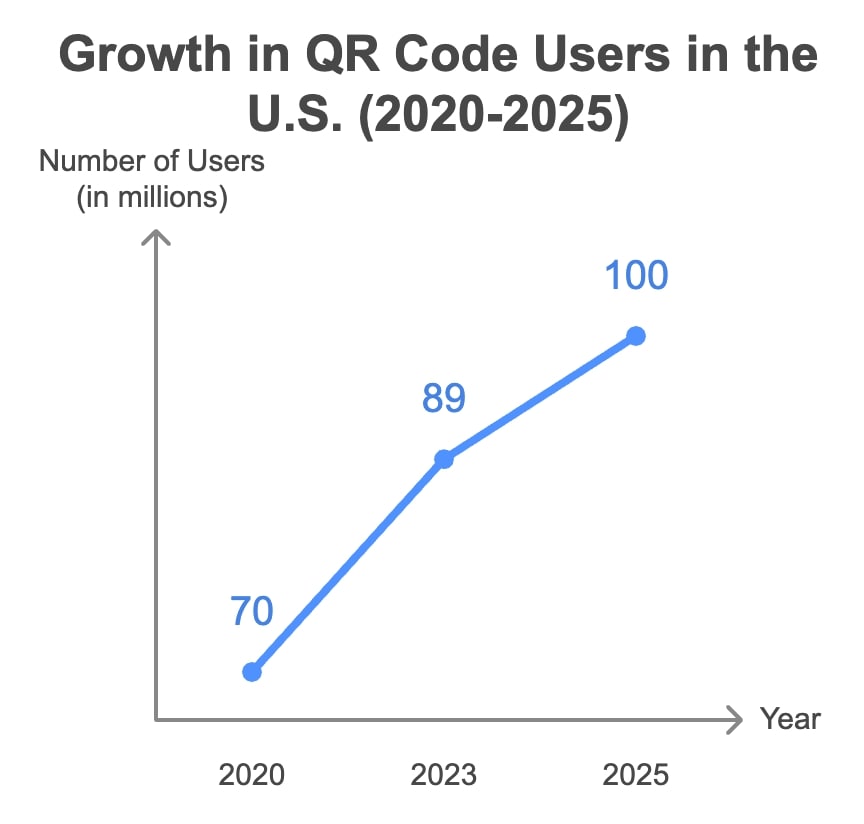
In short, as technology continued to evolve, the tools used for event management also saw substantial progression. The rise of QR codes remarkably streamlined and enhanced the efficiency of numerous event management tasks.
QR Code Badges Explained
QR code badges have become pivotal elements in the toolkit of modern event management. Essentially, these are identification tools used at events to enhance attendee management and interaction. A QR code, short for Quick Response code, is a type of matrix barcode that stores various types of data that can be scanned using smartphones or barcode scanners.
In addition to providing essential information about the attendee, such as name, affiliation, and ticket type, these digital badges act as visual identifiers within the event environment, fostering a seamless on-ground event experience. Moreover, these badges empower event organizers with multiple operational advantages, from improved efficiency to valuable data collection.
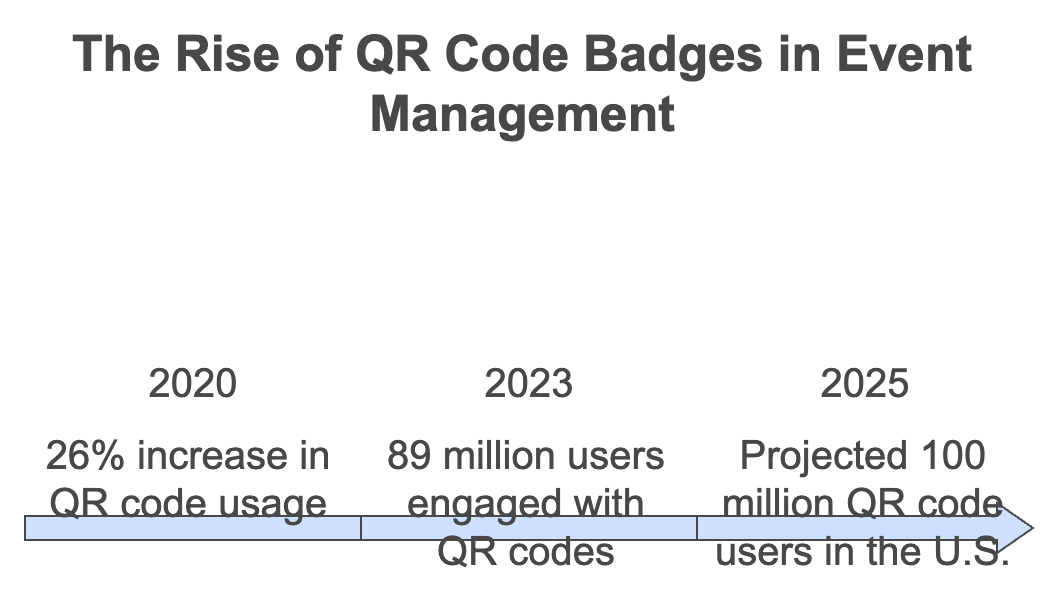
Let's substantiate the effectiveness of QR event badges with some statistical insight. As per a comprehensive survey from Statista, nearly 89 million users engaged with QR codes in 2022, marking a notable 26% rise from 2020. Tracing this upward trajectory, mobile QR code scanners are projected to cross the 100 million users mark by 2025 in the U.S, exemplifying the increasing utility and acceptance of QR code technology.
Custom QR Code Badge Types
Custom QR code badges offer versatility and are designed to cater to different needs and preferences of an event. Each type serves unique purposes and brings distinct advantages to the table for event managers. Here’s the categorization of common QR code badge types:
Standard QR Code Badges: These are the most basic forms of digital badges, containing essential attendee information encoded into the QR code. They are ideal for general event identification and quick check-ins.
Interactive QR Code Badges: These badges come with QR codes that link to interactive content, such as surveys or event schedules, enhancing real-time engagement during events.
Digital QR Code Badges: Representing the epitome of going paperless, these are virtual badges displayed on a mobile event app. They are perfect for hybrid or fully virtual events.
Smart QR Code Badges: These are advanced badges featuring both QR codes and Radio-frequency identification (RFID) or Near frequency communication (NFC) technology. These are suitable for tech-enabled events offering touchless interactions.
Branded QR Code Badges: These are custom-designed badges that incorporate event branding along with the QR codes, lending a professional touch to the event.
Premium QR Code Badges: Used for high-profile events, these are high-quality, durable badges featuring advanced functionalities such as RFID wristbands with QR code integration.
Eco-Friendly QR Code Badges: In alignment with sustainable event practices, these badges are manufactured from recycled materials. They carry QR codes and are ideal for environmentally conscious events.
Major Problems Addressed by Custom QR Code Badges
In the context of event management, QR code badges do more than just digitize the check-in process; they serve as comprehensive solutions for several bottlenecks traditionally involved with event management. Here we present the key issues in traditional event management and illustrate how custom QR code badges provide solutions for each.
Reduces Wait Times: Long check-in lines and ensuing impatience among attendees are common at events. Quick scanning offered by QR code badges drastically cuts down wait times and makes check-ins quick and efficient.
Minimizes Errors: Automation of the check-in process via QR codes ensures data accuracy and minimizes human errors in attendee management.
Enhances Security: Each QR code badge carries unique code data, acting as a reliable defense against fraudulent entries and bolstering event security.
Reduces Paper Waste: By replacing paper tickets and printed materials, QR code badges have significantly brought down the physical waste generated during events, aligning with sustainability goals.
Improves Personalization: QR codes can be programmed to link to personalized profiles of attendees, delivering tailored content to them, and thereby boosting attendee engagement.
Allows Real-time Adjustments: Given that the QR codes are linked to dynamic databases, event organizers can make instant updates or changes as required, ensuring real-time accuracy of event data.
Streamlined Data Collection: The systemized scanning of QR code badges automatically collects and collates valuable attendee data, offering useful insights to event organizers.
Enhances Access Control: Leveraging QR codes in badges can offer precise control over access to various event areas, effectively handling different levels of attendee access.
Top Benefits of Custom QR Code Badges for Event Management
QR code badges bring along an impressive array of advantages for the realm of event management. Here, we delve into discussing the significant benefits of implementing digital QR code badges at events, both from the perspective of event organizers and attendees:
Streamlined Event Check-In with QR Codes: Quickly scanning QR codes significantly speeds up the check-in process, drastically reducing wait times at entries and providing a smooth start to the event.
Real-Time Updates: QR code badges sync with the event registration platform and allow for real-time updates. If an attendee changes their session or contact details, the registration system immediately updates this information, and the QR code on their badge reflects these changes.
Reduced Paper Waste: QR code badges have played a major role in bringing events closer to achieving sustainability by reframing practices that previously led to enormous paper waste. Digital QR code badges significantly cut down the need for physical tickets and printed materials.
Personalization: QR code badges can be used to enhance personalized communication and engagement with the attendees. Additionally, they can also be encoded to deliver tailored offerings like exclusive offers and role-specific instructions.
Seamless Networking: QR code badges can facilitate seamless networking among attendees. Participants can scan each other’s QR codes to instantly exchange contact information, making networking quick and efficient.
Instant Access: By allowing instant access to digital event materials and schedules with a simple scan, QR code badges add to the convenience factor for attendees.
Accurate Attendance Tracking: QR codes present powerful tools for precise attendance tracking while providing detailed insights into attendee movements and session popularity.
In-depth Event Analytics: The analytics derived from QR code data offer critical insights for organizers into attendee engagement and behavior at events.
Enhanced Access Control: With custom QR code badges, event organizers can effectively manage access to various areas or sessions at an event.
Each of these advantages brings with it profound efficiencies and conveniences, improving event experiences for both organizers and attendees.
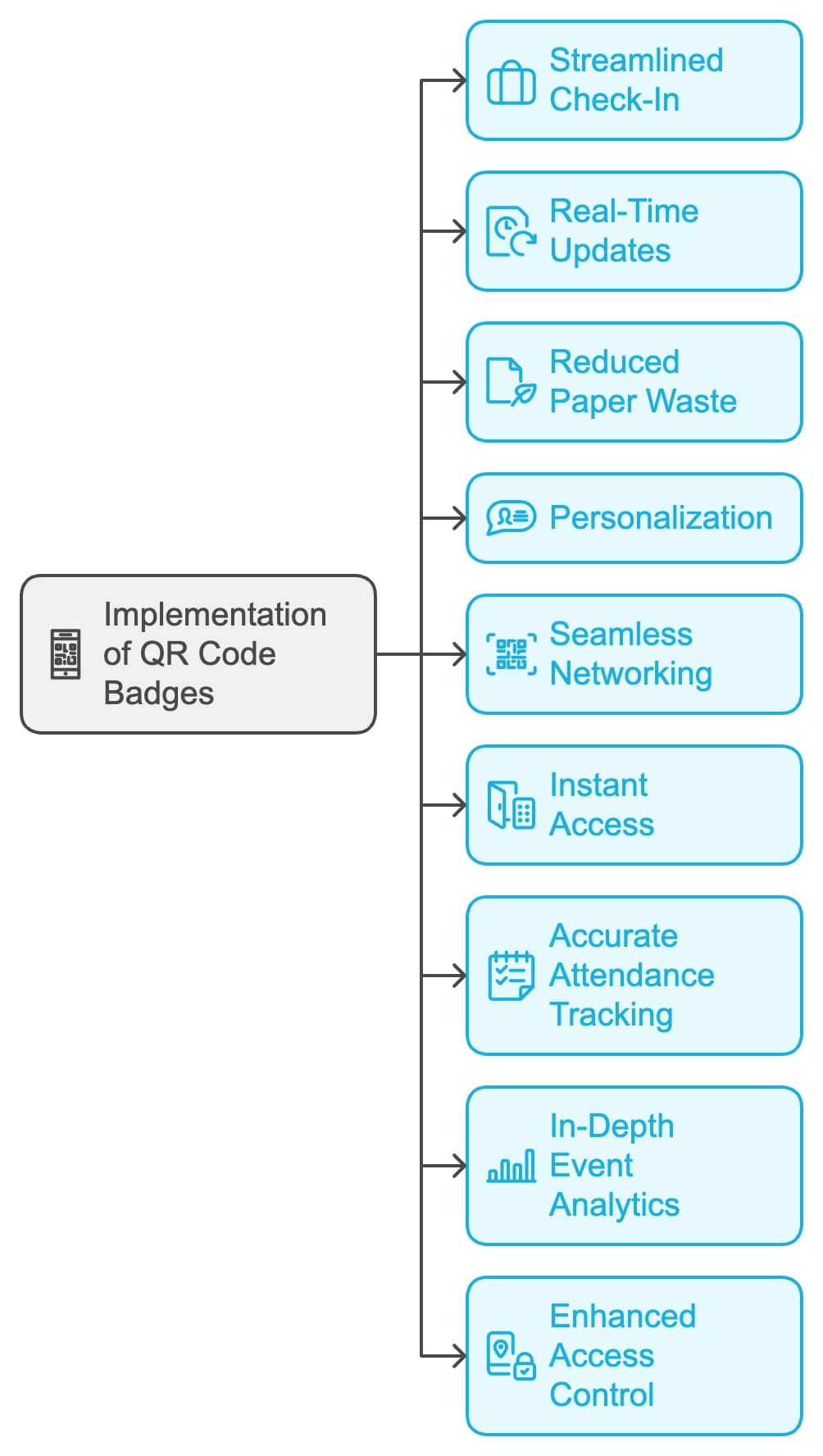
Scanning the Landscape: QR Code Usage in Networking
Networking is arguably one of the most critical aspects of any event. Attendees seek to forge new connections, exchange ideas, and potentially trigger synergies. QR code badges have made networking an effortless task.
At an event, attendees can simply scan each other's QR codes—which is typically printed onto their event ID badges—to exchange contacts. In contrast to the traditional business card exchange, this digital method dramatically increases efficiency and eliminates the problem of lost or mixed up business cards. Notably, the exchanged information can include more than just phone numbers and email addresses; links to social networking profiles, websites, and even personal portfolio documents can be shared.
According to a study by the QR Code Marketing Association, QR codes have promoted a networking efficiency increase of up to 70% at several business events.
Navigating the Pros and Cons: Challenges and Considerations in Using QR Codes in Events
While QR codes offer numerous solutions and advantages, like most technologies, they're not without challenges. It's crucial to understand these potential challenges and make informed decisions to leverage QR code technology effectively at events.
Technical Issues: Ensuring system reliability is crucial. Prepare for scanner errors and visibility issues with backup solutions and on-hand technical support.
Privacy Concerns: Using QR codes involves managing personal data. Make sure data protection laws are complied with, clearly explain how data will be used to attendees, and implement robust cybersecurity measures.
Cost vs. Benefit: The initial costs for QR code technology and setup may be high. Weigh the initial costs against potential benefits like improved efficiency and enhanced attendee satisfaction.
Integration Challenges: The QR code technology needs to integrate seamlessly with existing event management software and platforms. Conduct thorough compatibility tests to prevent any disruptions.
User Adoption: Both attendees and staff need to understand and be comfortable with QR codes. Provide clear instructions and prompt support to help users navigate the system with ease.
Scalability: Choose a versatile QR code badge provider that can grow with your event, accommodating any size and complexity your event may scale to over time.
Battery and Power Issues: QR code scanners and mobile devices used for check-ins require power. Keep charging stations ready, or have back up batteries to avoid disruptions from power drains.
System Downtime: Always have a backup plan in case of technology failures or system downtime. Offline solutions can manage check-ins and access control if the primary system fails.
Real-World Case Studies
To bring these concepts to life, let's look at some real-world examples where QR codes have made a tangible difference. In my experience, case studies like these highlight the practical impact beyond mere theory.
REBA Wellbeing Congress 2024: REBA partnered with fielddrive to implement QR code scanning with self-check-in kiosks. This reduced wait times significantly, integrated seamlessly with existing systems, and even turned check-in costs into a 20% profit through sponsorships.
Security & Policing Event by ADS Group: This high-security event used QR code check-ins for real-time verification and compliance. It enhanced security measures, simplified badge distribution, and minimized wait times.
These cases demonstrate how QR codes address real pain points, something competitors often overlook in their guides by lacking specific examples.
Overcoming Implementation Challenges
Building on the challenges above, here's how to tackle them head-on with actionable strategies:
For technical issues, invest in reliable scanners and have redundancies like manual lists.
- Address privacy by using GDPR-compliant tools and transparent data policies—I've found this builds trust quickly.
- Balance costs by calculating ROI; for instance, reduced staff needs can offset initial expenses.
- Ensure user adoption through tutorials and demos at registration.
Comparisons to Alternatives (e.g., RFID vs. QR)
While QR codes shine in accessibility and cost-effectiveness, alternatives like RFID offer touchless scanning but at higher costs and with privacy concerns. QR codes are smartphone-friendly, requiring no special hardware, unlike RFID which needs readers. In hybrid events, QR integrates better with apps. Choose based on your event scale—QR for budget-friendly, widespread use; RFID for premium, high-security scenarios.
Analysis of Expected Growth
Even though QR codes have already largely transformed event management, the potential for growth and further innovation is immense. As technology advances, the application of QR code badges in event management will likely expand, providing even more innovative ways to streamline processes and engage attendees.
With mobile functionality becoming more sophisticated, QR codes would see increasing integration with mobile event apps for greater versatility and functionality. Furthermore, the intertwining of QR codes with immersive technologies like Augmented Reality (AR) would radically enhance attendee interaction and engagement levels at events.
📊 Stats Alert: The Virtual, Augmented, and Mixed Reality market is estimated at USD 20.43 billion in 2025, projected to reach USD 85.56 billion by 2030 at a 26.30% CAGR.
In terms of data, the forecast looks promising. The use of mobile QR code scanners is projected to reach over 100 million users in the U.S. by 2025, indicating a constant growth trajectory in QR code usage.
Additionally, 47% of event professionals are embracing QR codes to elevate attendee experiences, and the events industry accounts for 7.88% of total QR code scans, ranking in the top five industries.
The global QR code payment market alone is set to grow from USD 15.95 billion in 2025 to USD 73.44 billion by 2035 at a 16.5% CAGR.

Such trends denote not only an expanding market but also the evolving expectations and preferences of event attendees. Therefore, event organizers need to stay abreast of these trends, adapt, and innovate to consistently deliver efficient and engaging event experiences.
Updated 2025 QR Code Trends and Projections
Looking ahead to 2025, QR codes are shifting toward more contactless, sustainable practices in events. With hybrid formats on the rise, expect gamification via QR for lead capture and feedback. AI personalization will make QR experiences more tailored, and blockchain integration could enhance security.
Conclusion
From the discussion above, it's clear to see the benefits of implementing event check-in using custom QR code badges, despite the potential challenges. The impact of QR code technology in revolutionizing event management is immense.
Technology has simplified many processes in event management, from registration to attendee engagement. QR code badges have introduced efficiencies and conveniences to traditional procedures and increased the effectiveness of event management.
Moreover, as technology evolves, QR codes will inevitably present new innovative applications for event management. The trend indicates an ever-expanding landscape of possibilities for streamlining processes and enhancing attendee engagement. This growth and the continual innovation in technology will undoubtedly carve the way for even more efficient event management.
For event organizers, embracing modern technology like QR codes aligns event practices with technological advancements and evolving attendee expectations. This adaptability is key to providing efficient, convenient, and engaging event experiences.
Ultimately, the success of an event is defined by the collective experiences of its attendees. And in this digital era, QR code technology and its applications have proven to be formidable allies of event organizers in delivering successful and memorable events.
Frequently Asked Questions about QR Code Usage in Event Management
What is a QR Code?
A QR code (Quick Response code) is a type of matrix barcode that stores data. When scanned using a smartphone or a dedicated barcode scanner, it can provide quick access to the stored data, such as a web link, text, or contact information.
How are QR Codes Used in Event Management?
In event management, QR codes can be used for various purposes such as digital event tickets, attendee badges, program schedules, networking, and others. They make the event check-in process swift and efficient, provide real-time updates, reduce paper waste, allow personalization, enhance networking, and ensure accurate attendance tracking.
Are There Different Types of QR Code Badges for Events?
Yes, different types of QR code badges are designed to cater to different needs at an event. Some of them include standard badges, interactive badges, digital badges, smart badges, branded badges, and eco-friendly badges. Each of them carries unique functionalities and benefits.
What are the Benefits of Using QR Code Badges at Events?
QR code badges offer numerous benefits at events including streamlined check-ins, real-time updates, reduced paper waste, personalized attendee experience, seamless networking, instant access to digital event materials, attendance tracking, comprehensive event analytics, and enhanced access control.
Are There Any Challenges in Implementing QR Code Badges at Events?
While QR code badges offer numerous advantages, there can be challenges in implementing them. These include technical issues, privacy concerns, cost considerations, integration with existing systems, user adoption, scalability, battery and power issues, and system downtime. Each of these challenges can be addressed with appropriate strategies and backup plans.
Is the Use of QR Code Badges Expected to Grow in the Future?
Yes, the use of QR code badges is predicted to grow in the future. As per a report from Statista, mobile QR code scanners are projected to exceed 100 million users in the U.S. alone by 2025. This statistic and the growing trend towards digitization in event management indicate an upward growth trajectory for QR code usage.

